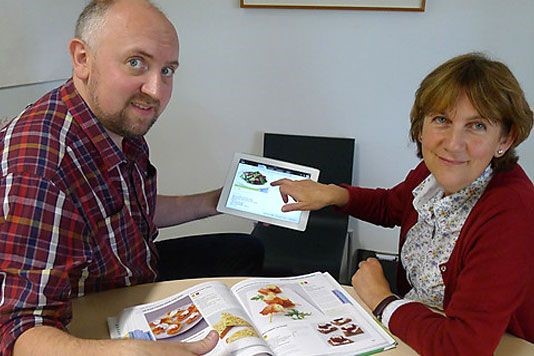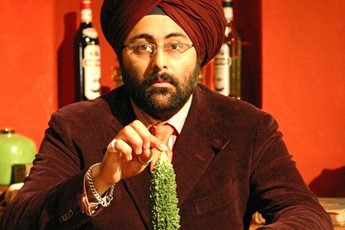What's the future for cookbooks?

In this app-enabled digital age, what's the future for the printed cookery book? Andrew Webb finds out.
This week I had a busman’s holiday and went all roving reporter for Radio 4’s The Food Programme to find out the future of the cookery book. The question grew out of a piece I wrote for the BBC Food blog in September 2011 entitled, ‘who needs cookbooks?’ So off I went, criss-crossing the capital to hear the views of publishers, agents, authors and app developers in the hope that one of them might help me find out where things are going. You can hear the programme here, or get the podcast here.
The publisher’s tale
I began in the Strand offices of Dorling Kindersley with Publisher for DK Life Mary-Clare Jerram (pictured), who’s worked in publishing for 30 years. "The last two years have been more exciting than any other times I can think of," she told me. DK always produced image-lead reference books, exactly the sort of things that work better on a tablet. She showed me a hardback, full-colour cookery book that retailed for £25, and the same content on an iPad for £3.99. That’s very significant.
One devil’s advocate question I put to Mary-Clare, which didn’t make the edit was, "haven’t we been here before with the CD-ROM?" For younger readers, CD-ROMs were once touted as the future. 'You can store entire encyclopaedias on one disk’, went the refrain. The reality was often very different: see this Amazon page for 10,000 recipes, a Windows 95 CD-ROM. The review sums up many people’s thoughts.
Publishers all poured significant revenue into this area, only to get their fingers burned. "They were priced too high," Mary-Clare told me, £80+ in some cases. So will apps be the CD-ROMs of the twenty first century? We’ll have to wait and see.
The author’s tale
 We have a soft spot for Hardeep Singh Kohli here at lovefood. His latest project, entitled A month of Sundays, lets anyone pitch for the chance to have Hardeep come round and cook a Sunday Lunch for them. The resulting 31 meals will form part of a book from ‘crowd funded’ publishing house, Unbound. Unbound is interesting because it changes the traditional publishing model, rather than the medium itself.
We have a soft spot for Hardeep Singh Kohli here at lovefood. His latest project, entitled A month of Sundays, lets anyone pitch for the chance to have Hardeep come round and cook a Sunday Lunch for them. The resulting 31 meals will form part of a book from ‘crowd funded’ publishing house, Unbound. Unbound is interesting because it changes the traditional publishing model, rather than the medium itself.
Hardeep talked about the power of the food blogger - people who do it for love rather than money. Of course what happens is that these people then get noticed, say interesting things, and then publishers sit up and give them paid work. We’ve done it here on lovefood with the likes of Chris Pople, Helen Graves and Niamh Shields. Which leads us on to…
The agent’s tale
Nearly all authors have agents, people and organisations who act on their behalf when dealing with publishers. They’re also on the lookout for new talent. Antony Topping represents the likes of Hugh Fearnley-Whittingstall and Thomasina Miers (as well as me), and he talks in the programme about how the role of an agent has changed in the digital age, and where new cooks and authors might come from.
The librarian’s tale
 This part of the day was perhaps the most revealing. The cookery book collection at the Guildhall Libary is amazing, containing Andre Simon’s books as well as Elizabeth David’s. Indeed, it was a memorable experience to hold Elizabeth David’s copy of Mrs Beeton’s Book of Household Management (pictured). I was struck also by the size of early books - the utterly fabulous ‘The Closet Of Sir Kenelm Digby Knight Opened’ was no bigger than a smartphone. It’s a book I’ve referenced many times, but it was a powerful experience to hold a first edition.
This part of the day was perhaps the most revealing. The cookery book collection at the Guildhall Libary is amazing, containing Andre Simon’s books as well as Elizabeth David’s. Indeed, it was a memorable experience to hold Elizabeth David’s copy of Mrs Beeton’s Book of Household Management (pictured). I was struck also by the size of early books - the utterly fabulous ‘The Closet Of Sir Kenelm Digby Knight Opened’ was no bigger than a smartphone. It’s a book I’ve referenced many times, but it was a powerful experience to hold a first edition.
The app developer’s tale
Finally, the complete opposite - off to Shoreditch for a chat with Ian Malone, MD of weareapps.com, a company that has begun to specialise in food app development. Some interesting developments centre around sharing recipes, generating shopping lists, and perhaps most importantly, turning the ‘page’ with dirty hands.
Where I think it’s all going
Recipes these days are everywhere: online, in magazines, next to the ingredients in the supermarket, and even on the products themselves. The BBC food website alone has over 14 thousand – which if you were to cook say two a day, is enough for 19 years. So humanity is not short of recipes. What we are short of, though, is quality, and the context of what that recipes means. I think the cooking ‘method’ will move online as it’s cheaper, quicker and more connected. Where books trump digital at least for now is in story telling, drawing you in and firing your imagination. As for the future, who knows. But in my experience it rarely turns out as predicted.
Do you increasingly reach for the laptop in the kitchen rather than the printed page? Tell us what you think the future of cookery books will be in the comments box below.
Radio 4 Food and Farming Awards
The cookery books chefs reach for
Five classic food writers you have to read
The best food book you've probably never heard of
Image courtesy of the BBC
Comments
Be the first to comment
Do you want to comment on this article? You need to be signed in for this feature